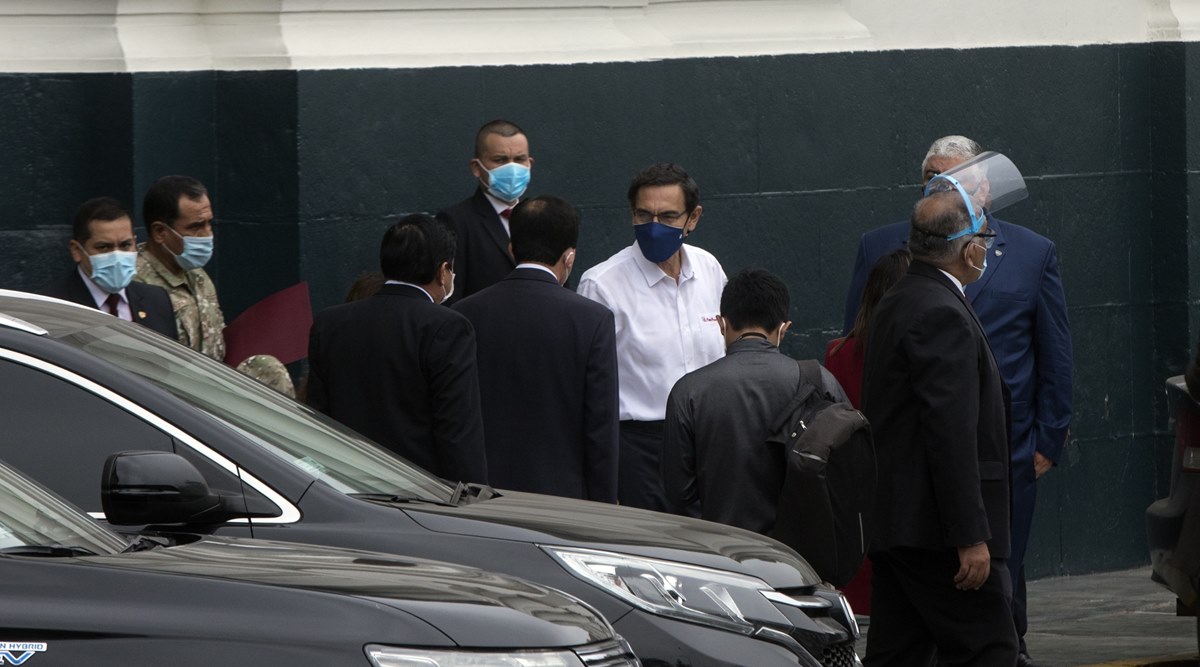Peru president survives impeachment vote amid Covid-19 turmoil
 Peru's President Martin Vizcarra, center, leaves Congress after addressing lawmakers in Lima, Peru, Friday, Sept. 18, 2020. (AP Photo/Rodrigo Abd)
Peru's President Martin Vizcarra, center, leaves Congress after addressing lawmakers in Lima, Peru, Friday, Sept. 18, 2020. (AP Photo/Rodrigo Abd)Peruvian President Martin Vizcarra survived an impeachment vote Friday night after opposition lawmakers failed to garner enough support to oust the leader as the country copes with one of the world’s worst coronavirus outbreaks.
The decision came after long hours of debate in which legislators blasted Vizcarra, but also questioned whether a rushed impeachment process would only create more turmoil in the middle of a health and economic crisis.
Lawmakers appeared to be far short of the two-thirds majority vote required to remove Vizcarra from office, but even if he dodged the impeachment attempt, analysts warned that he would not escape the ordeal entirely unscathed.
It remained unclear Friday night when a vote would be held.
Vizcarrra’s ability to carry forward the anti-corruption agenda he has sought to make the hallmark of his short administration could be further jeopardised if Vizcarra is perceived as having engaged in influence peddling himself.
“His credibility in carrying through that agenda is already problematic,” said Jo-Marie Burt, a senior fellow with the Washington Office on Latin America. “This really hangs in the balance.”
The political turmoil rocking Peru has briefly distracted attention from one of the world’s worst coronavirus outbreaks and involves a cast of characters that could easily fit into a soap opera.
At the center of the ordeal is Vizcarra’s relationship with a little-known musician known as Richard Swing and nearly $50,000 in questionable contracts that he was given by the Ministry of Culture for activities like motivational speaking.
A covert audio recording shared by Edgar Alarcin, a lawmaker himself charged with embezzlement, appears to show Vizcarra coordinating a defense strategy with two aides, trying to get their stories straight on how many times the musician had visited him.
In remarks before Congress Friday, Vizcarra asked for forgiveness for the upheaval the audios have generated but insisted he has committed no crime.
He called for a proper investigation and urged lawmakers not to aggravate the nation’s already precarious situation by rushing through an impeachment proceeding.
“Let’s not generate a new crisis, unnecessarily, that would primarily affect the most vulnerable,” he said.
During a long day of debate, many lawmakers expressed frustration with Vizcarra, blasting his apology as a weak attempt to make amends and demanding a thorough investigation.
But numerous legislators also said they couldn’t support an impeachment that itself was rushed and full of flaws, held before an official probe reaches any conclusions.
“It’s not the moment to proceed with an impeachment which would add even more problems to the tragedy we are living,” lawmaker Francisco Sagasti said.
Vizcarra became president in 2018 after Pedro Pablo Kuczynski resigned the presidency under pressure by Congress after the discovery of about $782,000 in undisclosed payments to his private consulting firm by Brazilian construction giant Odebrecht, which is at the center of a regionwide corruption scandal.
Odebrecht has admitted to paying some $800 million in bribes to officials across Latin America, and nearly every living former Peruvian president has been implicated in the scandal.
Vizcarra, at the time a vice president serving as Peru’s ambassador to Canada, is an engineer by training and was considered an unknown political novice. But he has managed to become a highly popular president, recently getting a 57% approval rating in a poll despite Peru’ s severe economic fallout from the COVID-19 crisis and the high infection rate.
Many Peruvians see him as a frank-talking leader who has taken on corruption, dismissing Congress last year in a brash move cheered by citizens as a victory against a dishonest class of politicians and pushing through initiatives to reform how judges are chosen and bar politicians charged with crimes from running for office.
“He’s the only president who without a lot of power has faced off against those shameless people,” said Pedro Quispe, a retired teacher out selling face masks on a recent day.
Steve Levitsky, a Harvard University political scientist, said Vizcarra has made “some modest steps forward” when it comes to corruption.
“He hasn’t been able to carry out all the political reform that he and his allies hope to,” Levitsky said. “But corruption in middle-income countries is never eliminated in a single presidency.”
Vizcarra tried to halt the impeachment by filing a lawsuit with the Constitutional Tribunal, but magistrates ruled Thursday that the process could proceed, under the belief that lawmakers would not actually be able to oust him.
While analysts have criticised the rushed procedure in which the impeachment proceeding was initiated within hours of the audio’s release, many agreed that the president owes Peruvians an explanation.
Vizcarra didn’t delve into details in his statement Friday, though he did point to inconsistencies in statements by a former aide who made the audios and said the only proven misconduct is having been illicitly recorded.
“The best thing the president could do is go to Congress, explain the audios and go hibernate,” said Alonso Cirdenas, a politics professor at the Antonio Ruiz de Montoya university in Lima. “Let his ministers take the spotlight until his government is up.”
To what degree the current scandal could nonetheless taint the seven months he has left in office remains to be seen.
📣 The Indian Express is now on Telegram. Click here to join our channel (@indianexpress) and stay updated with the latest headlines
For all the latest World News, download Indian Express App.
tinyurlis.gdclck.ruulvis.netshrtco.de
